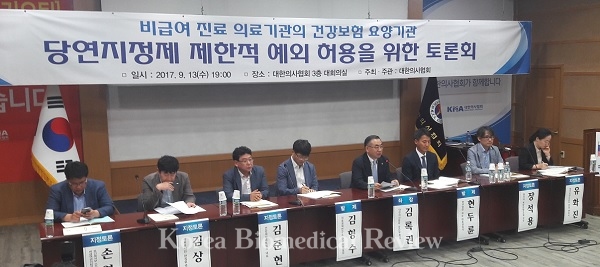The medical community tried to water down the “compulsory designation system” to cope with the “Mooncare,” during a recent conference, but the Ministry of Health and Welfare (MOHW)보건복지부 did not budge an inch.
Korean Medical Association (KMA)대한의사협회 held a forum Wednesday with the aim of allowing exceptions from the current system, which obligates all the hospitals in the nation to be designated as institutions applied by state-regulated charging of medical fees.
“One of the reasons the Constitutional Court ruled the compulsory designation system of hospitals constitutional in 2002 and 2014 was it could guarantee the options and autonomy of doctors because of the existence of uninsured medical services,” said Kim Hyung-soo김형수, director of Research Institute for Healthcare Policy(RIHP)의료정책연구소. “Now that the new government is seeking to turn all uninsured services into insured ones, the rationale of the ruling could become contradictory.”
“The coerced designation system violates the autonomy of both medical professionals and patients,” Kim said. “Doctors can’t make their best efforts for treatments due to health insurance and patients can’t be guaranteed of their rights to get treatments of the highest quality.”
Most treatments by the primary care institutions are now covered by insurance with the portion of uninsured treatments declining to 18.4 percent in 2013, 17.1 percent in 2014, and 14.8 percent in 2015, Kim pointed out.
“Laws and regulations to force medical instructions into health insurance system are the remnants of the old era,” Kim said. “To reinvigorate medical services and the medical industry and satisfy the public’s need for advanced medical services, current laws and regulations to designate hospitals by force should be supplemented.”

The Ministry of Health and Welfare made clear its position it could never nullify the system, however.
“The government opposes the abolition of the system,” said Sohn Young-rae손영래, director of the ministry ‘s Health Insurance Policy Bureau. “If the system is repealed, a private medical market will open beyond the control of the government control, which will make the gap in healthcare access among the people too wide.”
“If we abolish the system, the healthcare insurance law has to be revised, but the contract to optional contract system would bring no significant benefits to the people,” he said. “It 's hard to persuade the public to accept the changes in the healthcare system that will give them little substantive benefits. Nor will it be easy to revise the law at the National Assembly.”
Pointing out that the discussion to repeal system isn’t timely, Sohn said the medical community is going too far if it calls for the abolition of the system in response to the expansion of health insurance, and advised it point problems in it and try to improve them instead.
The legal circles also said it would be difficult to reverse the verdict from the Constitutional Court, advising the medical community to work out more realistic measures.
“There is little possibility of reversing the ruling about the system,” said Hyun Du-ryun현두륜, a lawyer at Kim & Hyun. “If the court is to change the decision, public medical institutions have to account for about 50 percent of the total, but it seems difficult under the current health care system.”
“If it 's hard to repeal the compulsory designation system, the medical community should try to improve the system to secure an optimal level of medical fees,” he said. “It would be a more realistic alternative that doctors form a committee to improve the policy and make separate responses to specific issues.”

